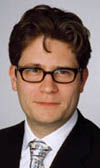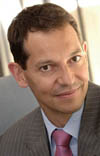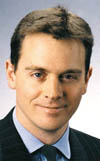Will equity derivatives’ fortune go from strength to strength?
Equity derivatives’ performance last year was overshadowed by losses in other areas, and activity was not as strong as it could have been, but of all investment banking business areas it was the equity derivatives sector that delivered the best goods. Natasha de Terán investigates whether the sector can rise to the challenge of 2008.
According to research from Citigroup, the cash equity business was the strongest growing sector for banks in the second half of last year. But equity derivatives came a close second and, because derivatives margins are higher than those on the cash side, it is a reasonable presumption to make that it will have been the best business sector from a profit standpoint.
Ever coy about direct profit numbers, equity derivatives heads are nonetheless unanimously upbeat about overall performance. David Herzberg, global head of equity derivatives at JPMorgan, says: “In the past two years, we have doubled our equity derivatives revenue and 2007 was again a record year – although it would have been even better if the benign market conditions had continued beyond July.”
Alvise Munari, head of equity derivatives marketing in Europe, Middle East and Africa (EMEA) at Merrill Lynch, says 2007 provided opportunities for everyone. “It was an extremely successful year for equity derivatives… for retail, institutional and hedge fund investors, as well as for strategic corporate business.”
Others put some of the market’s success down to the strong performance of structured products.
|
|
“Because a lot of the products that expired in 2007 paid out well, investors were inclined to reinvest their cash back into the structured products market,” says Stefan Wagner, European head of equity derivatives structuring at Citigroup. |
Driving business
One of the big drivers of the equity derivatives business last year was the rise of the Chinese, Indian and Middle Eastern markets. “This captured investors’ attention and, because many used structured products to gain exposure to the markets, this translated into a good amount of equity derivatives business,” says Mr Munari.
For Remi Frank, global head of equities and derivatives sales at BNP Paribas, 2007 was “the year of Asia” for equity derivatives. Other strong business areas included the burgeoning private wealth market, which sapped up record amounts of structured products. Hedge fund and growing institutional investor demand, meanwhile, fuelled the flow markets.
Mr Herzberg says that more insurance and pension funds also contributed to growth when they started looking for tailored solutions. Typically these were trades that hedged out market risk from portfolios, leaving funds with only mortality risk. Such trades can extend for as far as 50 years. Another growth area for JPMorgan was the strategically driven business, particularly non-recourse financing for financial sponsors such as petrodollar investors and investment funds.
In these trades, investors might seek to take a $100m stake in a firm, putting down only $25m; banks lend the investors the remaining $75m, taking the shares as collateral and adjusting the collateral posting according to the share price performance over the term of the loan. The lending bank retains the right to liquidate the shares if they fall beyond a pre-agreed trigger point, but has no recourse to any form of security beyond that. Such trades are typically structured as total return swaps.
Crisis aftermath
With markets still reeling from the 2007 crisis and investors still nursing their credit crisis hangovers, bankers are understandably unwilling to predict another sell-out year in 2008. But they do concede that the ongoing uncertainty is encouraging a strong focus on risk management – a factor that will play straight to their strengths.
Most bankers are confident that equity derivatives will remain a key strategic focus for investment banks.
|
|
Luc François, head of global equities and derivatives solutions at Société Générale, believes the outlook for 2008 is “reasonably” positive. “We are anticipating quite strong growth and are planning to add another 100 front-office staff, but we are also quite cautious,” he says. |
|
|
Simon Yates, head of global equity derivatives and co-head of European equities at Credit Suisse, also remains optimistic about the sector’s outlook. “In the equity derivatives business, a little bit of volatility is a positive thing,” he says. “As long as the swings are not wild and the equity markets don’t experience a major upheaval, 2008 could prove to be another record year. The enquiry levels on all sides are strong as we enter 2008.” |
More pessimistic bankers believe that growth rates will be more subdued. If the equity markets continue to be bearish, things will less positive for the business, though not dire, says Mr François. “Hedge funds play both sides of the markets and investors will of course continue to seek out protection and guarantees. But all investors have a tendency to play the upside better than the downside, so there is always more capacity to make money in a bullish market than there is in a bear market,” he says.
Post-crisis outlook
The trick for equity derivatives groups now lies in identifying exactly what the effects the 2007 crisis will have on their business: where the biggest business opportunities will lie, which areas will see business fall off, and which products and strategies will hold particular appeal.
Aaron Brask, head of equity derivative research at Barclays Capital, says that if the higher volatility levels are sustained, more risk transfer can be expected to take place. “At the most simplistic level, that will be in the form of a put option, while the variance swap will be the tool of choice for leveraged investors,” he says.
There are high expectations that the EU’s Undertakings for Collective Investment in Transferable Securities III (Ucits III) directive will have a significant impact on the use of derivatives. “[It] should stimulate demand for derivatives usage, particularly in Germany, where fund wrappers had traditionally been less widely used than certificates because of the relatively unfavourable tax treatment that the fund wrapper received,” says Alberto Garcia Elias, head of European structured retail products at Credit Suisse.
Mr Wagner is equally confident about the impacts of Ucits III. He also says that hedge funds should continue to be active and that funds running 130/30 strategies will probably start using swaps. He believes that structured equity products should also are well, not least because they can usefully be deployed in more volatile and uncertain markets.
High net worth market
On the private wealth side, bankers remain uniformly positive. Mr Frank, at BNP Paribas, says: “The high net worth market was a strong driver of our business in 2007 – and will remain so. Structured products have now been recognised by the providers to this sector as a real asset class. Before the internet bubble burst, many private banking groups were unwilling or reluctant to sell on structured products, but they have since recognised that they offer valuable and useful financial profiles that they are unable to replicate.”
More investors are likely to look to derivatives-based structures and structured products as a way of gaining more precise exposures to very specific parts of the risk curve and parts of the market. “They will also be interested in market-neutral and uncorrelated investments, which will again probably drive them towards the structured products area,” says Mr Munari
Others believe institutional investors will use the instruments for yield enhancement and capital protection purposes, while more active investors will exploit the increased market volatility. William Kennedy, managing director of equities at UBS, also forecasts continued demand from the high net worth sector for structured products.
On the product side, Beat Von Gunten, head of structured investments distributor marketing for EMEA at JPMorgan, says he believes that asymmetrical pay-offs and capital guarantees are likely to hold particular appeal.
There are further positives, not least of which is the fact that a good portion of assets will not be returning to the structured credit market. David Moroney, head of structured assets at Barclays Capital, says he believes that some of these investors will turn to the equity and hybrid side of the structured product market in search of the same sort of returns that they were previously achieving from the tranched credit market.
Growth opportunity
Mr Herzberg agrees, with the caveat that the challenge will be to develop the kind of risk-return profile that these investors seek. But he also says that the real growth opportunity lies in servicing the demands of those catering for an ageing population. “Even if the cycle is more challenging in the months ahead, product providers will still have to deliver Alpha for the retirement side of the business and they recognise that they have to use derivatives to do so,” he says.
In the year ahead, Asia’s performance is one of the great unknowns. Equity derivatives groups have invested heavily in the region and been rewarded well, but the soaring equity market performance of the past few years has left the region with distinctly precarious valuations. Even so, Mr Yates says he believes that as long as there is only a modest pullback in Asia, the markets will continue to grow. “In fact, a certain repricing of equity valuations there might even prove beneficial,” he says.
Adding all those comments together, it is impossible to conclude anything other than that equity derivatives groups are going to have a healthy pipeline of business in the year ahead. “We cannot ignore the crisis,” says Mr Frank. “But, bar a strong fall off in the equity markets, the outlook for 2008 is quite positive.”





